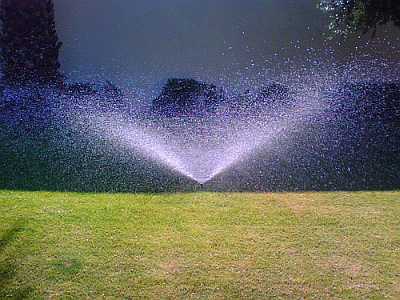The RSPB wants you to water your lawn until it is ‘green and lush’
- Complaining about the Mainland - 17th August, 2024
- New island designation – is it just greenwash? - 26th April, 2024
- Police and Crime Commissioners – a solution or a problem? - 21st April, 2024
There’s some surprising advice in the RSPB’s latest press release, “Water your wildlife”. In an otherwise unremarkable bit of seasonal filler they exhort us to put out water for the birds this summer – a good idea, if you like birds.

But for some reason this particular press release goes further than the usually canonical advice on ‘birds and water’, and ‘lawns and wildlife’ on the RSPB’s own website, despite appearing to be at least partly based upon it. The piece starts off chirpily with an unashamed bit of anthropomorphism:
We all understand the concepts of drought, water shortages and hosepipe bans. But the thirsty creatures in our gardens are not so au fait with these issues and still need our help being hydrated this summer.
Unfortunately, there remains some evidence that we don’t all understand these problems – or at least, not enough to avoid them. But more to the point, why on earth would one expect ‘thirsty creatures’ to do so? And do they actually need our help? Really? Or do they just need to be left alone, with plenty of habitat, and allowed to get on with their lives? Helping wildlife is all very well, but if we magnify our own role to an essential one, well, I think we’re over-exaggerating the beneficial effect of humans to wildlife just a teeny bit. The press release continues:
The RSPB is urging everyone to ensure they continue to provide fresh water for garden birds and other wildlife, and keep lawns, trees and shrubs green and lush so they provide insect food.
Now to be fair, it doesn’t suggest using a lawn sprinkler, and does mention right at the end of the release that “You could also use’grey water’ from things such as baths or preparing vegetables and salads to keep your lawns saturated.” But if anyone has ever carried out the contents of a bath or sink to water a lawn, you’ll know just how effective that would be. Let’s just say you’d need to wash an awful lot of lettuces. A hosepipe or sprinkler would be the only real way to keep a lawn growing throughout the hot summer; and these things use a lot of water. A sprinkler, for example, can use as much water in an hour as a family of four uses in a day. So I was disappointed to see the RSPB suggesting that lawns, trees and shrubs need to be kept ‘green and lush’ during drought conditions to benefit wildlife, when in fact it could have the opposite effect. In parts of England the shortage of fresh water and over-abstraction from rivers is having a serious effect on wildlife – for example, the RSPB rightly says in its own advice on using water wisely:
In order to keep our wetlands healthy, we need reliable supplies of water. Yet there are parts of our islands where the amount of water being abstracted to supply households, industry and agriculture is unsustainable, and damaging to wildlife… Some 500 wetlands, rivers and lakes are on the Environment Agency’s register of sites at risk from or being damaged by water abstraction – this includes 151 Sites of Special Scientific Interest.
So if you do want to help wildlife, take the wider view. Do put out water for the birds by all means, but far more importantly, save water where you can. Don’t bother using a sprinkler on your lawn – or if you must, just use enough water to keep it alive rather than recreate the Amazon in your back garden.

I’ve just bought a water butt pump to recycle bath water onto the garden – it beats running up and down the stairs with a watering can!
The Ranger responds: Thank you ghostmoth, for the Google traffic you are about to bring me(!)
It is wise to conserve water whether there is a drought or not. You never know what’s around the corner from a climate/weather perspective and water stored in soils is available when needed.
Bill:www.wildramblings.com